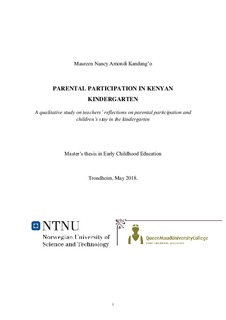Parental participation in Kenyan kindergarten - A qualitative study on teachers' reflections on parental participation and children's stay in the kindergarten
Master thesis
Permanent lenke
http://hdl.handle.net/11250/2574568Utgivelsesdato
2018Metadata
Vis full innførselSamlinger
Sammendrag
To reiterate Toni Buchan’s own words, ‘a generation of parents has grown up in an era where there is someone (or something) available to do most things for you’ (Buchan, 2013, p. 61). This research study draws from today’s reality that most households in urban Kenya today engage the services of domestic workers/ house-helps. It is estimated that nearly 2 million households in the country’s capital, Nairobi, alone hire domestic help (Kidula, 2014). Their roles include not only helping with household chores, but also taking care of children. Parental participation in school-related activities has significantly dropped. For instance, among other duties, the house-helps drop off and pick up children from the kindergarten, assist with homework, sign the children’s diaries (daily journals), and sometimes, on behalf of the parents, they attend activities organized by the preschool. Consequently, most parents leave the education of their children to the teachers, as they sometimes see themselves inadequately prepared to deal with the demands of school and school-related activities. Sometimes the parents do not get involved because they do not know how to, except to meet financial obligations of their children’s schooling.
This study, therefore, sought to find out, through interviews, observation and personal experience, how parental participation is understood, and how the relationship between the parent and the teacher can potentially influence the child’s stay in the kindergarten. The study draws from a Kenyan context and highlights kindergarten teachers’ reflections and experiences with parental participation.
Ethical principles of anonymity and confidentiality were upheld throughout the entire research process, and necessary permission and authorization were sought and granted.
